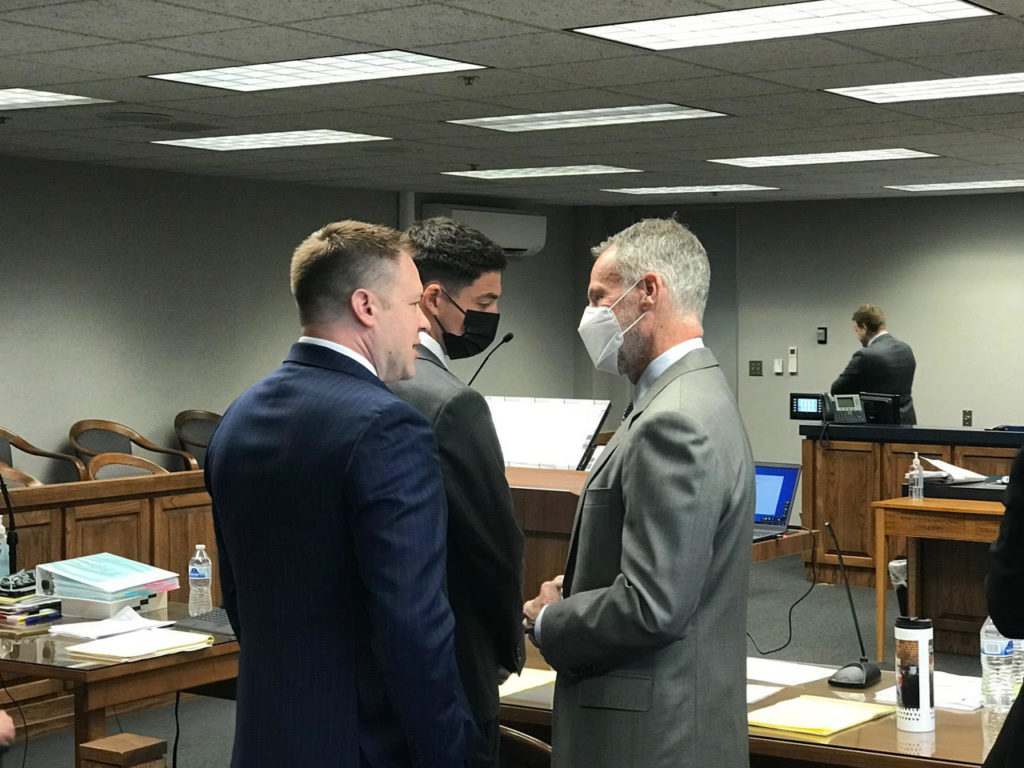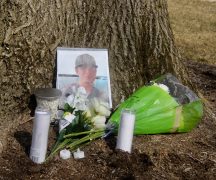By DAVID DUPONT
BG Independent News
Shari Foltz had a special relationship with her son Stone.
The mother of three was the first witness to testify in the trial of two former BGSU fraternity brothers charged in her oldest son’s death from alcohol poisoning.
“We were very close,” she said on the stand Wednesday morning in Wood County Common Pleas Court. “It was unlike most mom-son relationships. We’d speak daily, text daily. We had a very close relationship”
The last time she texted him was the night of March 4, 2021. Stone Foltz was getting ready to head out to the Big-Little gathering of Pi Alpha Kappa, the fraternity he was pledging at.
He was concerned because he expected it would involve consuming a large quantity of alcohol. She told him to be careful, and said she’d text back at 10 p.m. He laughed it off. She never texted. She was woken at the family’s Delaware home early the next morning by the family dog. When she checked her telephone, Mrs. Foltz learned something as seriously wrong. Her son was in the hospitalized in critical condition.
Three days later on March 7 he was dead after being kept alive to facilitate organ transplants.

The trial of Jacob Krinn, 21, of Delaware, and Troy Henricksen, 24, of Grove City, on charges related to his death began Tuesday afternoon.
Krinn, who was Foltz’s “big brother” in the pledging process, faces charges of first degree felony involuntary manslaughter, third degree felony involuntary manslaughter, reckless homicide, felonious assault, hazing, failure to comply with underage Alcohol Laws, and Obstructing Official Business.
Henricksen, 24, who was the new member educator and a former president of the fraternity, faces charges of third degree felony involuntary manslaughter, reckless homicide, tampering with evidence, hazing, and failure to comply with underage alcohol laws.
Shari Foltz said in her last conversations with her son, he seemed troubled, though she was not convinced that the issues he mentioned, school work, relations with his girlfriend, the pressure of pledging to the fraternity, got to the heart of it.
The 20-year-old sophomore business student had decided in early 2021 to pledge.
He felt it would help him come out of his shell socially and offer him connections that would benefit him later on.
He struggled with some of the required tasks like memorizing the PIKE, as Pi Alpha Kappa is known, preamble that dates back to the fraternity’s founding.
That night he was supposed to be home to watch the family dog while his parents traveled with his sister to a softball tournament. On a snowy night, he finally made it back to Delaware in the early morning hours. He said the exercise would help him with time management and multitasking.
Shari Foltz was tearful as she described arriving at the local hospital and being told of his poor prognosis before he was sent by air to Toledo Hospital. She wanted to fly with him but was not allowed.
At the Toledo Hospital she was told “he would never come out of it.” He only had 10 percent of his brain function.
Samuel Shamansky, the attorney representing Krinn, did not cross examine her, and Eric Long, Henricksen’s attorney, did so only briefly.
That was not the case for the two fraternity members who testified.
Niall Sweeney, 22, of Erie, Pennsylvania, was led by County Prosecutor Paul Dobson through the recruiting process leading up to his description of what happened at the Big-Little event that left Foltz critically ill.
Sweeney lived at the house at 318 N. Main St., in Bowling Green, where the event was held. Hosting the event was a last minute decision.
He and his roommates also members of PIKE were concerned about hosting the event. One reason was they were concerned about pledges “yakking” all over the couch in the basement. They decided to get garbage cans for pledges to vomit in because they were expected to drink so much.
The event, he said, had an expectation that after the identity of the pledge’s “big” was revealed, they would drink a bottle of the liquor traditionally consumed by members of the family, the lineage of bigs and littles going back into the fraternity’s history.
The expectation was that the littles would consume the whole bottle.
At one point, Sweeney said that if the pledges didn’t drink their bottles, he’d pour it down their throats.
It was, he said, a bad joke.
The bigs were expected to take care of their littles after the event. He also recalled that Krinn bragged in crude terms about how intoxicated Foltz got, commenting further on the pledge’s inability to hold his liquor.
But in the cases of both Sweeney and Grant Hartnett, who was a pledge, the defense attorneys pressed the idea that there was no requirement to do any of this, and indeed, some students didn’t.
In fact, many of the tasks supposedly required of pledges – gathering signatures of members, cleaning their houses, memorizing the preamble – could be ignored without repercussions.
They noted that Henricksen was not even at the house the night of the Big-Little, a fact that Hartnett said he found odd.
They questioned how much he had to do with actually setting up the events.
Long said these expectations were nothing more than “myths and urban legends.”
Shamansky said everything they did was off their own volition. “It was all on you.”
The trial continues today and is expected to run at least into late next week.




